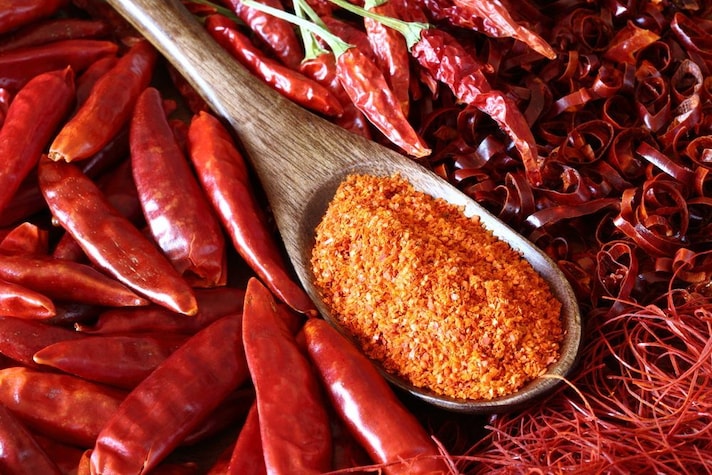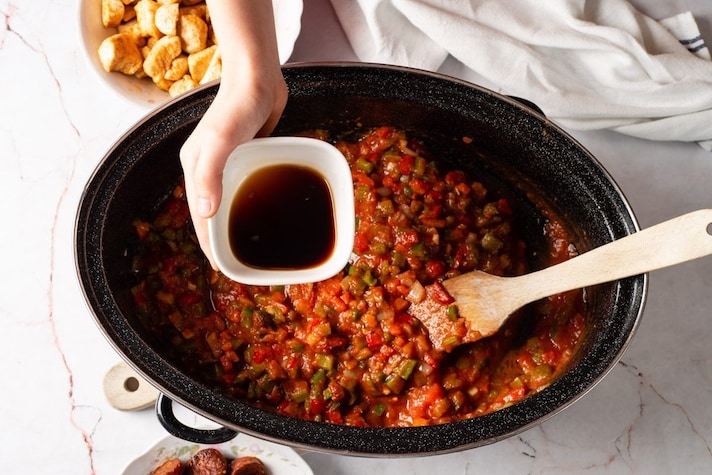
You've just bitten into that super-hot chili pepper, or a nice piece of spicy salami, and now a few droplets are running down your forehead toward your chin: it's spicy food sweating, a completely normal reaction of your body to capsaicin, along with the blush. But why do spicy foods have this effect on us? And is capsaicin harmful if ingested in large quantities? Here are the answers to all your questions about spicy foods and reactions.
What is Capsaicin and Why Does it Make Us Sweat?
You don't just sweat; on the contrary, the first visible sign after eating a very spicy dish is a flush. Immediately afterward, if we don't stop, the famous droplets appear, which gradually turn into sweat. When we eat something spicy, our body reacts in a very visible way: we start sweating and our face turns red. But why does this happen?
The answer lies in capsaicin, the substance that makes chili peppers spicy: this molecule acts on pain receptors in the mouth, sending an alarm signal to the brain. The brain, in turn, triggers a series of physiological reactions aimed at protecting our body. Capsaicin activates specific receptors (mostly located on heat-sensitive nerves), which perceive a general increase in body temperature above 104°F/40°C (between 109/43 and 122/50°F/C in the most severe cases). This explains the classic hot flashes, which vary in severity depending on how exposed we are to these types of foods.

Through these receptors, capsaicin sends signals to the nervous system, specifically to the hypothalamus, a cluster of nerves in the brain responsible for body temperature regulation. At this point, the sweat glands are activated. The logical consequence of this entire process is therefore the activation of sweating (especially on the face), which lowers body temperature.
Here's what happens in detail when you eat spicy food:
- Increased body temperature. Capsaicin creates a sensation of heat in the mouth and esophagus. To disperse this excess heat, the body triggers sweating.
- Vasodilation. Blood vessels dilate to bring more blood to the affected areas, causing redness of the face and other parts of the body.
- Increased heart rate and respiratory rate. The body attempts to increase tissue oxygenation to cope with the stress caused by capsaicin.
- Endorphin production. To counteract the burning sensation, the brain releases endorphins, substances that have an analgesic effect and can produce a feeling of euphoria.
You might wonder why we have receptors that make us suffer when we eat something spicy: in reality, these receptors evolved to help us avoid toxic substances. Many plants produce pungent substances as a defense mechanism to discourage animals from eating them.
Having explained why and how the sweating process is triggered, why do we often blush when we eat spicy food? This is due to the dilation of blood vessels, which dissipates heat and thus reduces body temperature. In conclusion, whether you like spicy food or not, we want to clarify this; the important thing is to avoid dangerous endurance challenges like those that have become so popular recently.

Why We Like Spicy Food and How Bad It Is
Despite the burning sensation, many people enjoy spicy food. This is because the release of endorphins creates a feeling of pleasure and can be addictive. But is it bad to eat too much spicy food, and if so, in what quantities?
Excessive consumption of spicy foods can have negative health consequences: although chili peppers and other hot spices offer numerous benefits (such as increasing metabolism, reducing appetite, and having anti-inflammatory properties), excessive consumption can cause various problems, especially gastrointestinal problems. There is no precise amount of spicy food that can be defined as a "limit" for everyone, as tolerance to spicy foods varies from person to person and depends on several factors such as habit, taste bud sensitivity, health conditions, and so on.
What are the risks of eating too much spicy food?
- Mucosal irritation. Capsaicin, the substance that makes chili peppers spicy, can irritate the mucous membranes of the mouth, esophagus, and stomach. This can lead to heartburn, acid reflux, and, in more severe cases, ulcers.
- Intestinal problems. Excessive consumption of spicy foods can cause diarrhea, constipation, and other intestinal problems.
- Increased blood pressure: In some people, spicy foods can temporarily increase blood pressure.
- Aggravation of pre-existing conditions. Those suffering from inflammatory bowel disease, ulcers, or gastroesophageal reflux should limit their consumption of spicy foods, as they may worsen the condition.
There are specific situations in which it's best to reduce or avoid chili peppers: during pregnancy and breastfeeding, it's advisable to moderate spicy food consumption, as it can cause heartburn and other discomfort; children have a more delicate digestive system and may be more sensitive to the irritating effects of capsaicin. Finally, as we age, sensitivity to spicy foods may increase.
;Resize,width=767;)
